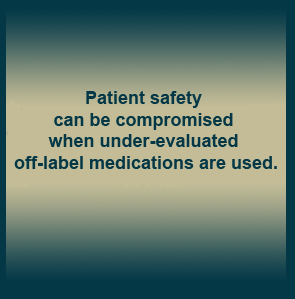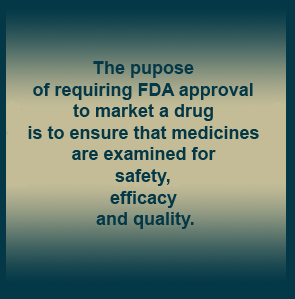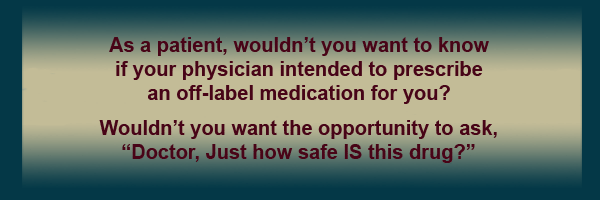

OFF-LABEL DRUG USE
 |
 |
Pros and Cons of Off-Label Drug Medication |
| PROS |
CONS |
1. The Prohibitive Costs of Obtaining FDA Approval-
The process of gaining FDA approval for a drug's new use can be as expensive and time-consuming as gaining the initial approval for the drug. If the new use of the drug does not present a potential for high profit, manufacturers often do not have an incentive to seek FDA approval for new uses.
2. Faster Availability of Drugs-
The patient benefits of using a drug in an off-label manner greatly outweigh the costs and delays of obtaining expanded approval from the FDA, which would result in a lengthy delay in making the new use available to patients.
3. Physicians Are Better Qualified Than the FDA to Judge Patient Medication Needs-
Physicians, not the FDA, are in a position to determine their individual patients’ circumstances and needs. Denying a physician the right to prescribe an off-label medication could result in diminished patient care.
|
1. Lack of Research Standards-
There is no physician standard for drug study design, documentation, data collection methods, or statistical analyses. Both careless or well-meaning physicians may draw indefensible conclusions which they then present as scientific facts in medical journals, thus perpetuating their unreliable conclusions.
2. Unregulated Experimentation-
Allowing physicians to experiment with off-label medication turns patients into unsuspecting guinea pigs. Just as a manufacturer must prove a drug’s safety and efficacy before acquiring FDA approval, new uses for old drugs should also be proven safe and efficacious before they can be prescribed.
3. Some Physicians ARE NOT Better Qualified Than the FDA to Judge Patient Medication Needs-
Without licensing for research, without a physician standard for drug study design, how is it possible to determine which physicians are qualified to make decisions that normally require years of research and data compilation before a conclusion is reached? How does an individual patient know if his or her physician is capable of making this type of decision?
4. Adverse Consequences of Off-Label Medication-
Adverse consequences of off-label medication often go unreported. Due to the litigious nature of our society, physicians are especially vulnerable if their patients know that an adverse consequence was due to being medicated with drug that was not FDA approved for the patient's condition. Since the physician required no approval to use the drug in an off-label manner, the physician is under no scrutiny to report the adverse consequences of using the drug.
|

|
CATCH 22: Off-Label Drug Medication in Children
|

|
Most drug use in children is off-label because there is a lack of clinical studies on children. Drugs used off-label in children can be ineffective and can sometimes have detrimental effects. This can be a result of extrapolating adult drug data and applying it to children. Since there are few child clinical studies, there is no other way to treat children other than attempting to adjust adult medication for child uses.
Basically, there are two methods of extrapolating adult doses to children:
1. Adjusting the dose based on weight, and
2. Scaling weight to surface area.
Both of these methods can pose problems because children are not mini-adults. Children's bodies absorb, metabolize and excrete drugs differently than do adult bodies. The problem is compounded by the fact that there are various "levels" of children. Neonates react to drugs differently than toddlers, who react differently than young children, who react differently than teenagers.
The lack of clinical drug studies in children leaves parents with few options other than to trust their physicians. However, parents should be aware of this situation and not hesitate to discuss any concerns with their children's health care provider.
|
WHAT ALL THIS MEANS FOR YOU-
THE PATIENT AND DRUG CONSUMER
Off-label drug use is here to stay. Perhaps more importantly, there are many benefits of off-label drug medication. If the practice were discontinued, it is likely that more patients would suffer from the lack of off-label medication than now suffer from the misuse or adverse side effects of off-label medication.
Because of this, The Ronald Andrew Holloway Foundation has opted to support legislation requiring informed concent for off-label medication rather than supporting efforts to prohibit off-label medication.
When off-label medication goes wrong, it frequently goes very wrong. Examples of this are the heartbreaking stories of Thalidomide, Fen-Phen, and Cytotec. But for every one of these horror stories, there are tens of thousands of people who benefit from their off-label medications.
The Ronald Andrew Holloway Foundation believes that patients have the right to know when their doctors want to use an off-label medication. The patient then has the responsibility to weigh the benefits and consequences of using the drug and, in discussion with their health care provider, make an informed choice whether or not to use the drug.
Our Mission:
TO EDUCATE THE PUBLIC about patient rights and responsibilities
TO SUPPORT LEGISLATION requiring patients' informed consent
for off-label use of prescription medication
|
|
|
|
| |